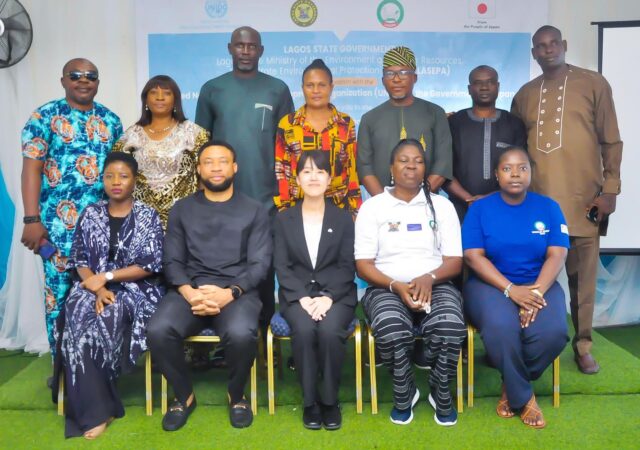Text of Press Briefing by The Nigerian Institution of Environmental Engineers, Lagos State Chapter.
By Engr Yusuf Majolagbe
Ladies and Gentlemen, Distinguished guests, and Fellow Environmental Advocates.
Good morning and thank you for joining us today as we observe the World Environment Day (WED) 2024. This year’s WED has the theme, “Land Restoration, Desertification, and Drought Resilience.” while the slogan is “Our Land, Our Future”. While all these elements are crucial, I will talk extensively on Land restoration as that is one of the solutions to the biggest challenges faced in Lagos State today.
The health of our planet begins with the health of our land. Land is not just the ground beneath our feet; it is the foundation of the ecosystems, the provider of food, the keeper of biodiversity, and the regulator of climate. Yet, it is under threat like never before. Desertification and droughts are symptoms of a much larger problem—a problem that we can address through dedicated land restoration. In addressing this, the Office of Political, Legislative and Civic Engagement of the Lagos State Government has the responsibility to sensitize and advocate laws passed by the House of Assembly particularly the sections relating to Climate change, the Built environment and Agriculture.
THE IMPORTANCE OF LAND RESTORATION
The SDG goal on land restoration is Goal 15: Life on Land, which is to Combat desertification, restore degraded land and soil, and strive to achieve a land degradation-neutral world. Land restoration is about more than just repairing degraded land; it is about rejuvenating the land to its full potential. It means returning vitality to soils, bringing back native vegetation, and reviving the ecological processes that sustain life. Healthy land is resilient land, capable of withstanding the pressures of climate change and human activity.
Restoring degraded land can lead to a cascade of positive effects. It enhances food security by improving agricultural productivity, supports biodiversity by creating habitats, and mitigates climate change by sequestering carbon in soils and vegetation. Furthermore, it provides economic benefits like creating more jobs, increasing land value, reducing environmental cost and improves the livelihoods of communities that depend directly on land resources.
CHALLENGES OF DESERTIFICATION AND DROUGHT
According to United Nations Convention to Combat Desertification; UNCCD Global Land Outlook for the year 2017, which highlights the extent of desertification and its impact on populations worldwide; Desertification, the process by which fertile land becomes desert, is a major global challenge. It affects over 3.2 billion people worldwide, contributing to poverty, food insecurity, and displacement. Droughts, exacerbated by climate change, further stress our land and water resources, creating cycles of scarcity and hardship. Desertification affects 35% of Nigeria’s total land area and poses a threat to the livelihoods of over 40 million people.
To combat these challenges, we must first address the root causes: unsustainable land management practices, deforestation, overgrazing, and improper agricultural methods. These practices strip the land of its nutrients and protective vegetation, making it vulnerable to erosion and desertification.
According to the Great Green Wall Agency, responsible for implementing the Great Green Wall for the Sahara and the Sahel Initiative in Nigeria, over 5 million hectares of degraded land had been restored as of 2022. The African Forest Landscape Restoration Initiative (AFR100) also confirmed that Nigeria had restored over 5 million hectares of degraded land, making significant progress towards its commitment of restoring 100 million hectares.
Over 1,300 hectares of degraded land have been restored in Lagos State through various environmental initiatives and programs. which includes: efforts by the Lagos State Ministry of Environment’s “Clean and Green Initiative”, the Lagos State Parks and Gardens Agency’s (LASPARK) efforts to restore and maintain parks and gardens across the state and the “Eko Atlantic City” project, a large-scale reclamation and restoration effort aimed at creating a new city on reclaimed land.
STRATEGIES FOR EFFECTIVE LAND RESTORATION
Effective land restoration requires a multi-faceted approach. Here are key strategies we must prioritize:
- Sustainable Land Management: Implementing practices that maintain and improve the health of the land. This includes crop rotation, conservation tillage, and agroforestry.
- Reforestation and Afforestation: Planting trees on degraded land to restore forest cover. Trees play a critical role in stabilizing soil, regulating water cycles, and providing habitats for countless species. They also act as carbon sinks, helping mitigate climate change.
- Soil Restoration: Techniques such as adding organic matter, reducing chemical inputs, and using cover crops can restore soil health. Healthy soils are the bedrock of agriculture and ecosystem resilience.
- Water Management: Efficient water use through technologies like drip irrigation, rainwater harvesting, and constructing check dams to capture and store rainwater.
- Community Involvement: Engaging local communities in restoration projects ensures the sustainability of efforts. Local knowledge and participation are crucial for the success of any land restoration initiative. The Office of Political, Legislative and Civic Engagement is well positioned to drive this initiative.
BUILDING RESILIENCE AGAINST DROUGHT
Building resilience against drought goes hand-in-hand with land restoration. Healthy, restored land can better absorb and retain water, reducing the impacts of drought. It can also support more diverse and resilient agricultural systems that can withstand extreme weather conditions.
Addressing these issues requires a synergized effort. The federal and state government, NGOs, the private sector, and civil society must collaborate to scale up successful land restoration practices. Policies that incentivize sustainable land use, funding for restoration projects, and international cooperation are essential.
The United Nations Convention to Combat Desertification (UNCCD) and initiatives like the Bonn Challenge and the Great Green Wall Initiative are vital frameworks for our efforts. We must align our national and local actions with these global initiatives to maximize impact.
As we mark World Environment Day 2024, I implore the Lagos State Government to commit to restoring our lands, not just for today, but for future generations. Land restoration is a powerful tool to combat desertification and build resilience to drought. It is an investment in our future, in the health of our planet, and in the well-being of humanity.
Let us embrace this challenge with determination and hope. Together, we can restore our lands, rejuvenate our ecosystems, and create a sustainable and resilient future for all.
Thank you.
NIEE: Towards a Sustainable Environment ….
Engr. Yusuf Majolagbe, PMP, MNSE, FNIEE, FHISD, FOSHA
NIEE Lagos State Chairman







